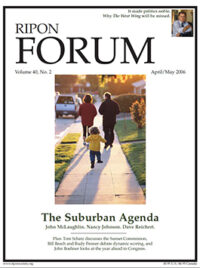It’s not often that Jimmy Carter and George W. Bush agree on an issue. But when it comes to cutting programs and getting government spending under control, there is one issue on which they see eye to eye.
The issue is the establishment of a Sunset Commission. For the second straight year, President Bush is proposing the creation of such a commission as part of his budget plan. Under this proposal, every federal agency and government program would automatically receive a 10-year expiration date, at which time they would essentially be required to justify their existence. It would be the job of the Sunset Commission to determine whether their justifications have merit.
…the idea of establishing a Sunset Commission is very bipartisan in nature. It was first proposed by the late Democratic Senator Edmund Muskie of Maine in 1976.
The Sunset Commission would be comprised of seven members – two selected by the majority in Congress, two by the Congressional minority, and three by the President. Their task would be to evaluate every federal agency and program and recommend if it should be abolished, streamlined, consolidated, or reauthorized with recommendations for improvements.
The overarching mission of the Sunset Commission would be to make government work better, and make sure federal programs earn the taxpayers’ dollars. By consolidating programs and eliminating waste, the Commission would save tax dollars and improve program performance. At a time of skyrocketing deficits, war, and concerns over how well our government is doing its job, these are two goals that are desperately needed.

Indeed, federal spending has increased at an alarming rate over the past 11 years. Total outlays were more than 60 percent higher in 2005 than in 1994. The situation will reach a crisis level when entitlement spending explodes with the retirement of the Baby Boomers. Short-sighted as ever, Congress is not taking the necessary steps to get spending under control. Congress fails to oversee and evaluate a large chunk of the programs it funds year after year. About 30 percent of the discretionary budget – or $170 billion in fiscal 2005 – is unauthorized. Congressional leaders usually waive the rule that requires federal spending to be authorized. Consequently, a number of federal programs coast under the radar without being reviewed by a congressional authorizing committee.
Government programs are often launched with great fanfare but receive scant attention when they crash and burn. The lack of accountability has allowed the federal budget to fester with wasteful, duplicative, outdated, and ineffective programs. Thirty percent of federal programs reviewed by the administration’s Performance and Assessment Ratings Tool have been found to be either ineffective or unable to demonstrate results. Citizens Against Government Waste’s report, Prime Cuts 2005, identifies wasteful spending that totals $232 billion in fiscal 2006 and $2 trillion over the next five years.
Members of Congress have little incentive to eliminate waste one program at a time. Every government program develops a constituency that profits from its continued existence. A Member of Congress must overcome fierce resistance to eliminate a single program, and the resulting savings is a miniscule slice of the total federal budget. Furthermore, proposals to eliminate programs must navigate a cumbersome process that requires approval from multiple congressional committees and committee chairmen who are not inclined to give up any turf.
Of course, such problems are not new; nor are they problems that only one political party has tried to address. In fact, the idea of establishing a Sunset Commission is very bipartisan in nature. It was first proposed by the late Democratic Senator Edmund Muskie of Maine in 1976. His bill mandated that all federal programs would be automatically shut down every ten years unless Congress voted to continue them. The bill enjoyed bipartisan support in the Senate with 55 co-sponsors, including Senator Edward Kennedy (D-Mass.).
Jimmy Carter endorsed the idea during his presidential campaign. In his 1976 biography, Why Not the Best?, Carter reflected upon his time as a Georgia state senator. He wrote that he was, “appalled to discover that we spent all of our time assessing proposals to finance new programs only. Once a program had been in operation for a year, there was little likelihood that it would ever be closely examined again.
It would just grow inexorably like a fungus…” Carter’s opponent in the 1980 presidential race and his successor in the Oval Office expressed a similar sentiment. “The nearest thing to eternal life we’ll ever see on the earth,” Ronald Reagan once stated, “is a government program.”
Thirty years later, many people inside the Washington Beltway still do not see the wisdom of establishing a Sunset Commission. But a growing number of Americans outside the Beltway do. There are 28 states that currently use some form of a Sunset Commission to promote fiscal accountability and responsibility within their respective state governments. In Texas, for example, strong support from the legislature has resulted in 90 percent of the State Sunset Commission’s recommendations being passed into law. According to Texas Republican Congressman Kevin Brady, the prime sponsor of the Sunset Commission bill in the House, it has also resulted in the elimination of 44 state agencies, saving state taxpayers $720 million along the way.
The federal response to Hurricane Katrina sparked renewed public attention on government accountability. It also reawakened congressional interest in waste-cutting commissions. In the wake of the storm last September, the House Government Reform Subcommittee on Federal Workforce and Agency Organization held a hearing on the issue, with one of the focal points of discussion being whether the time was right to establish a Sunset Commission.
Let there be no doubt – the time is right to establish a Sunset Commission. In fact, the time is long overdue. Taxpayers deserve the establishment of a common sense way to rein in spending and keep federal programs under control.
The Sunset Commission would do just that. It deserves to be enacted today.
Thomas A. Schatz is President of Citizens Against Government Waste.




